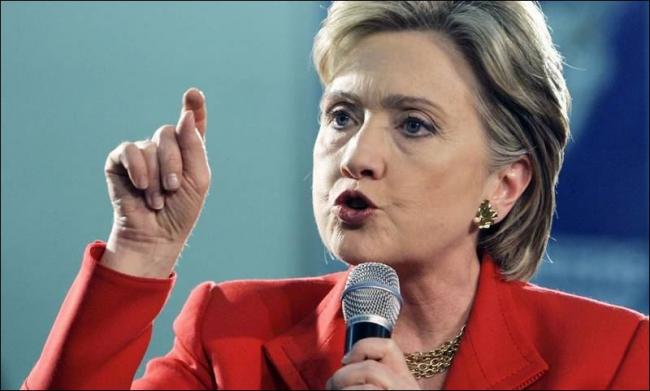Hillary Clinton: "No Uber for you!"

Clinton Sides with Unions against the Free-Market
On July 13th, Hillary Clinton outlined the overarching economic theme, “America’s middle class needs a raise” for her presidential campaign in a speech at the New School in Manhattan. Ironically though, the economic policies she rolled out go after the middle class, offering it less flexibility, independence and income.
Clinton seemed less than enthused at the sharing economy, exemplified by such companies as Uber and Airbnb:
Many Americans are making extra money renting out a spare room, designing websites, selling products they designed themselves at home, or even driving their own car. This on-demand or so-called 'gig economy' is creating exciting opportunities and unleashing innovation, but it's also raising hard questions about workplace protections and what a good job will look like in the future [emphasis added].
Clinton’s anti-contractor policy is not unsurprising as Politico reported that an aid said she would discuss her concerns with the sharing economy in her speech.
This condemnation did not go unnoticed in the media after its disclosure in the pre-speech outline. John Kartch, the communications director at Americans for Tax Reform, wrote in Forbes that:
Clinton will cast herself as the champion of Americans on the lower side of the income scale, and her specific proposals will be cloaked in the rhetoric of class struggle. But her “help” isn’t needed. The sharing economy is especially beneficial to those making less than average.
Clinton’s threatened stance sounds less like an informed policy decision and more as if it came from the playbook of a taxi union due to its little basis in fact. The sharing economy, engineered by innovations in technology from the Silicon Valley, successfully operates on the contractor business model. When a company like Uber hires a driver they are a contractor, not an employee.
The Uber app works as a connecting piece between consumers and drivers. The worker has complete control over how long and when they are on the road. For drivers this is extraordinarily attractive compared to traditional employment which would dictate and limit or increase hours beyond what the driver would prefer. This is part of the reason drivers – and consumers – have been flocking to Uber. After starting in mid-2012 the company had over 14,000 drivers in 50 countries and 140 cities worldwide by the end of 2014.
Uber and other sharing economy based businesses’ successes have made them targets of the business models that have failed to adapt fully into the 21st Century, particularly the unions. For Uber the taxi unions such as the International Transport Workers Federation, The National Taxi Workers Association and the Teamsters, in addition to sympathetic politicians have sought to destroy its business model. Clinton has just become the latest person to back the losing horse at the expense of those she claims to champion. Uber’s CEO Travis Kalanik acknowledges the battle the ride sharing company has been engaged in, “we’re in this political campaign, and the candidate is Uber. And the opponent is an a-hole named Taxi.
Taxi companies and unions can’t compete with competitors such as Uber, Lyft and Sidecar. Instead of evolving their own failing business models the taxi unions choose to hide behind their monopolies in the transportation industry.
In cities such as Boston, Uber is flourishing because the consumers have all the information about the driver, the car’s make, model and location, an accurate time estimate, a map, and fare estimate at their fingertips. Whereas many cabs may never even show up to their dispatch location to pick up their passenger; only 78 percent of dispatches in Boston are responded to according to the Boston Globe. At peak times it gets significantly worse, particularly when the bars are closing, only 10 percent of calls are responded to.
Not only does Uber fill the demand that taxis can’t meet, it offers drivers a flexibility that unions can’t. While taxi unions limit the number of cars on the road, Uber allows the drivers to drive whenever, wherever and for as much or little of their day as they want.
A January 2015 study entitled An Analysis of the Labor Market for Uber’s Driver-Partners in the United States conducted by the former chaiman of President Obama’s Council of Economic Advisors, Alan Krueger and Dr. Hall of Uber Technologies reported that, 87 percent of surveyed Uber drivers claimed, “to have more flexibility in my schedule and balance my work and with my life and family,” as a main reason they are happy with the company.
Why is Clinton suspicious of the sharing economy as it is so clearly based in innovation, worker choice and sound economics? Perhaps she defends the unions at the cost of the middle class because she courts the Democrats’ main donor base? Unions have been big supporters of her political ambitions in the past and continue to support her today: one of the most influential unions in the country, the American Federation of Teachers endorsed Clinton on July 11th.
If Clinton’s thinly-veiled threat against the sharing economy materializes into the deaths of innovative companies like Uber, will she be the one to drive me to work? I find that unlikely since she hasn’t driven a car since 1996.
Photocredit - National Right to Life News





